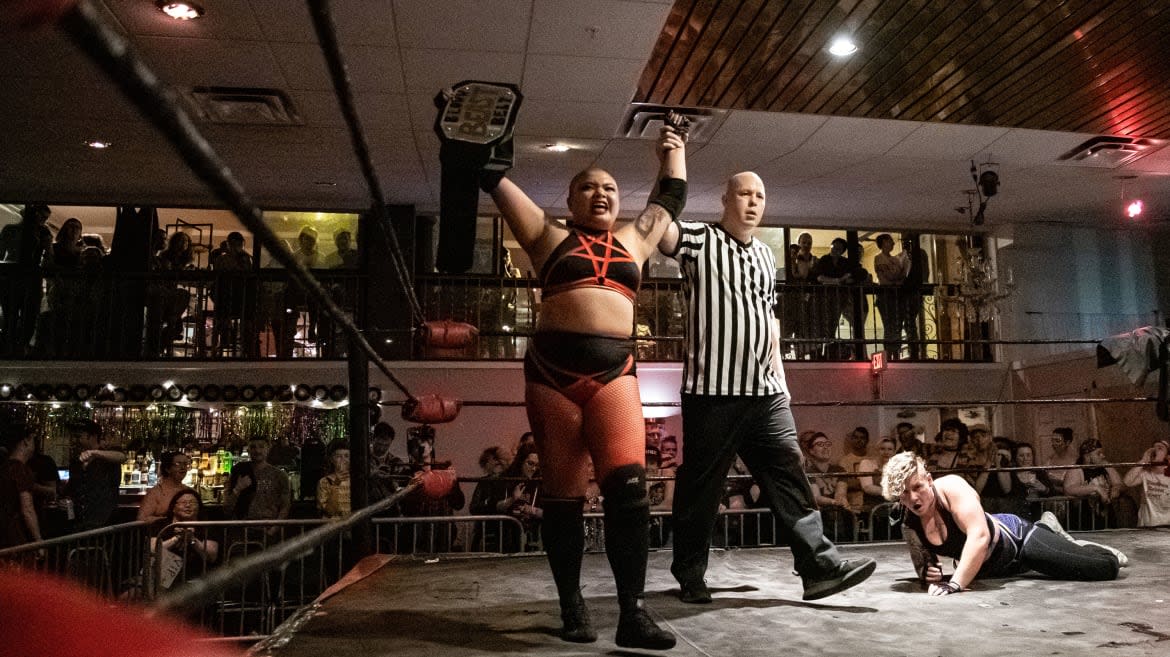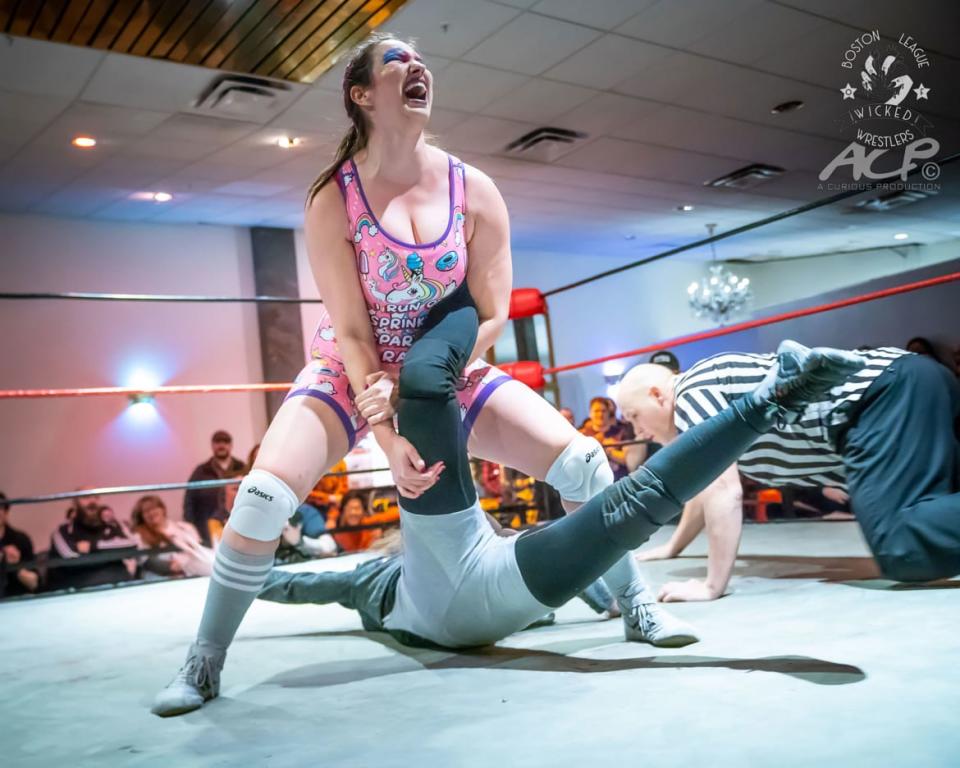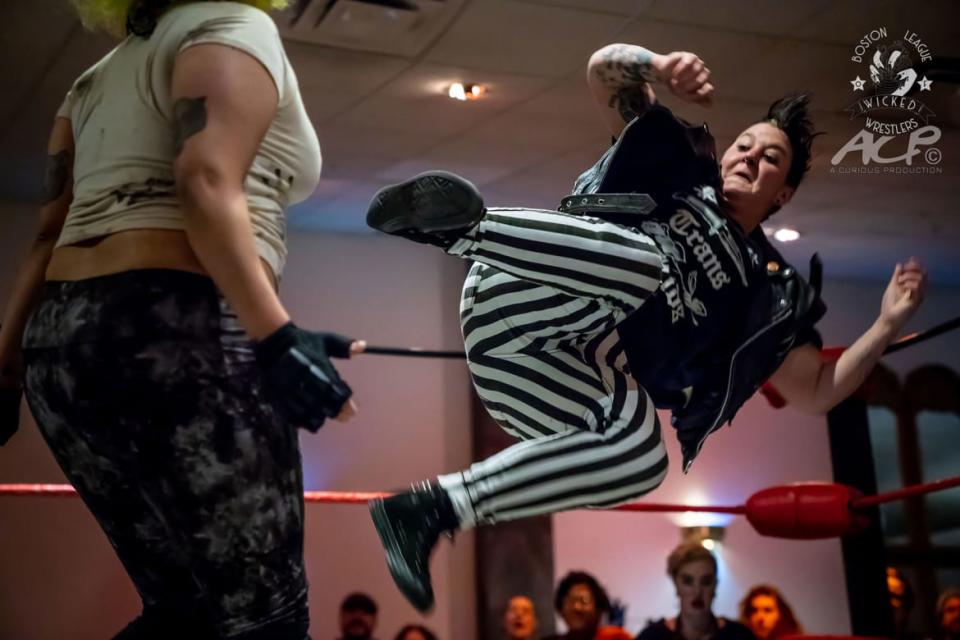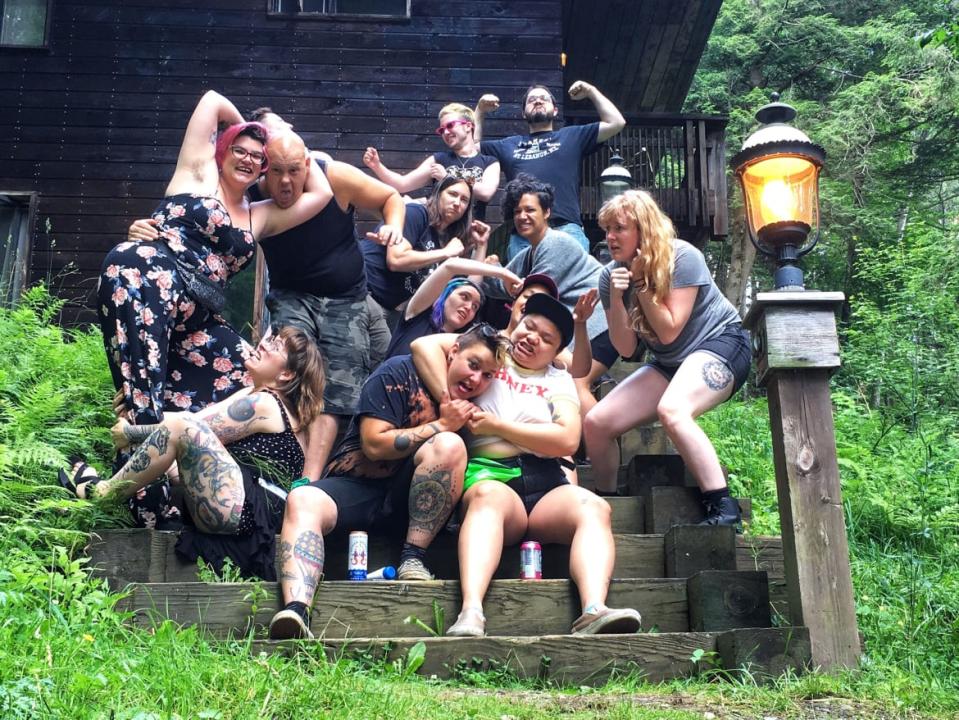The Rowdy Queer and Trans Wrestling League BLOWW-ing Stereotypes Away

The sport of wrestling is over the top and dramatic. The athletes are also performers, acting out years-long soap-operatic storylines while showcasing immense acrobatic skills and martial arts techniques. Traditionally, it’s been highly gendered, and roles for women within the sport have remained sexualized (see: WWE’s Divas). It also has a long history of queer- and transphobia. But an independent league is turning all that on its (literal) head—enter the Boston League of Wicked Wrestlers, or BLOWW, a queer, gender-inclusive wrestling experience that includes bodies of all shapes and sizes.
“This show will feature acts of violence between people of all gender expressions who have consensually agreed to fight each other,” reads a video at the start of their shows. “Welcome to violence.”
Over the course of the next three hours during a show in February, Sheila the Divorce Lawyer (from Brooklyn, offers specials for divorcing the same person twice or buy two get the third divorce free) and Becky (the heel of this show: a blonde, conventionally attractive woman) tag-teamed Queerasaurus Rex and Gemma the Bisexual Unicorn, known together as the “Sparkle Squad.” Valentine the Dominatrix fought Rat King, a trans man who is a fan of trash. The fans screamed and cheered—a crowd of queer and trans people you wouldn’t necessarily expect to be filling the seats of a wrestling match—and the room was packed for the entirety of the three-hour show. In between wrestling matches, the audience enjoyed drag performances.
Men Are Broken. Geena Davis Is Trying to Fix Them.
How Joe Rogan Made Trans MMA Fighter Fallon Fox’s Life a Living Hell
Outside of these bawdy performances, which “always punch up” (the bad guys are: “people in unearned positions of authority” and “people who benefit from systems of oppression”; the good guys are: “sex workers,” “the working class” and “magical creatures”), there is the story of the fighters themselves. Most did not grow up as athletes. None had previous wrestling experience before joining the league. Many thought there was no place for them in a sport like wrestling—until BLOWW created one.
BLOWW did not always exist in its current form. It started over 10 years ago as the Boston League of Women Wrestlers, a GLOW-esque outfit that threw mats down on the floor of bars and wrestled, spit beer in the faces of patrons, and heckled the men in the audience. It was scrappy and in-your-face which was part of its charm, but it was rough around the edges and didn’t always get the tone right.
“I saw BLOWW perform in 2010 as that original version and it was, like, sexy and everybody was drunk and there were actual injuries,” says Susie Newsie. The 32-year-old has been in BLOWW for almost three years and her character is a face (good guy in the wrestling world), a news reporter who often narrates the storylines during shows. “Whatever was happening then, I was like, ‘This is problematic and I don’t love it.’”
It served a purpose and existed in a very specific time and place, one that Punky Bruiser calls “very third-wave women’s feminism” and which Cherrill, who has been a member of BLOWW since 2014, admits had “the typical feminized sexualization, male-gaze slant.” But after Donald Trump was elected president, the shtick didn’t seem so funny or subversive anymore. “We looked around all of a sudden and decided we didn’t want to just do the barroom floor getting jeered at by men,” says Punky.
Not only that, Punky had come out as non-binary and had questions: Can they still wrestle in a league of “women wrestlers” even though they’re not a woman? And do they even want to be part of a league that misgenders them just by nature of its name?
So three years ago, the league decided to rebrand into something that was “decidedly not apolitical” and “explicitly trans-inclusive,” says Cherrill, “a radical queer [league] specifically putting queer identities, bodies, and stories to the front.” To signal that inclusion via both name and practice, the word “women” in the name was changed to “wicked.” It works as both a reference to Boston slang and the concept of “wickedness,” as in “playfully mischievous.”
Both wrestlers were in BLOWW in its first iteration. Punky is a heel described as “obnoxious” and “anti-capitalist” and hellbent on fighting anyone who believes in that system. Cherrill’s character is a face who works at Bradlees discount department store, a chain that hasn’t existed since the ‘90s.
In its former iteration, BLOWW would perform whenever, wherever. But with their rebrand, they decided to switch up some other things, too; they went from being self-taught wrestlers who fought on mats—something that’s incredibly dangerous—to receiving training and wrestling in a ring. They also decided to focus on doing four big shows a year—shows they could put their all into and make big and exciting and flashy without being a drain on the fighters, all of whom work actual, real-life jobs.
The shows—and the league—exist in their own universe, known as the BLOWW-verse. If you’ve been to every show, you’ll be able to follow the storylines throughout. But if you’re coming to your first one, you will still be entertained by the immediacy and understand the context for why these characters are fighting each other. Video production and social media presence help provide both continuity and context for the goings-on within the BLOWW-verse.
One night, there was a match between Cherrill and Rat King. Cherrill was sad because she had just broken up with her tag-team partner, Pammmmmmmmmmmmy, so Rat King tried to make Cherrill feel better by letting her win. When Cherrill caught wind of the dive, she became enraged—and the two began fighting “for real,” while Rat King wailed, “I’m just trying to make you feel better!”
“I was like, ‘This is the gayest shit I’d ever seen,” says Queerasaurus Rex, whose character is a friendly, rainbow-clad dinosaur. “I’m in!”
Much to the league’s surprise, BLOWW has sold out every single show. “It just goes to show that if you don’t expect to be hate-crimed at any minute, there’s a lot of people that really want to respond to and resonate with the art of pro wrestling,” says Cherrill, “people that maybe don’t feel like there’s a place for them as a spectator as well as an athlete.”
Pro wrestling is known for its celebration of toxic masculinity. And while independent leagues have popped up over the years to reclaim the sport from the male gaze, like SHIMMER in Chicago, BLOWW is one of the only—if not the only—one that explicitly centers queer and trans bodies.
By removing sexual objectification, it frees performers up to dress their characters in ways that feel true to their spirits. Krystal Aura—a “woo woo” character who would probably be found at Burning Man—wears a shiny, swimsuit-esque costume that’s more revealing than the performer behind Krystal would normally be comfortable with. “I know I can trust the audience to just be there with this weird character and not just be like, ‘Ooooh, girl in a swimsuit,’” she says. “I don’t know where else I could do that and feel comfortable.”
“It’s wildly important that this genre that relies so heavily on fantasy and pageantry has gay people in it,” says Cherrill. There’s also power in BLOWW being explicitly by queers and for queers. “None of us is watching this thing waiting for the other shoe to drop,” says Q-Rex. “People [at BLOWW shows] know they don’t have to hold their breath. We get a lot of people who have never had any interest in wrestling saying, ‘I want to see what a bunch of queer folks in a room together are doing with each other.’”

“Throughout wrestling’s sordid history, one of the easiest ways for an opponent to ‘get over’ on their opponent was by emasculating them,” BJ Colangelo wrote for Autostraddle. “Putting wrestlers in dresses or calling them ‘girls,’ like a schoolyard bully was commonplace, which means that for many years, the very thought of a transgender performer would immediately have become a joke.”
As recently as January of this year, there was a WWE women’s Royal Rumble that featured a male wrestler dressed as a woman. And while there are queer and trans people who are being let into the world of pro wrestling—like Nyla Rose, a trans woman who is the current Women’s Champion for All Elite Wrestling—they often have to jump through hoops and deal with a ton of harassment to be allowed in.
Q-Rex says they have conflicted feelings about Nyla Rose’s championship and role in AEW because Rose is a heel, an antagonist or “bad guy” in the world of wrestling. So often, the bad guys in popular culture are members of a marginalized group (think: the queer-coding of Disney’s villians), which Cherrill points out is “how you know they’re the bad guys—they’re marginalized.”
“Maybe [Rose] is a heel in that world” of AEW, says Cherrill, “but if you put her in the BLOWW ring, she’d be, like, Jesus or something.”
BLOWW is as much performance art as it is wrestling, and many of the wrestlers come to the league with no wrestling experience and backgrounds in theater or drag. “We wanted to break down all the barriers to being part of the league because you spend most of your life being held back from things as a person of a marginalized identity,” says Punky.
The league is open to anyone who wants to try out.

“Pro wrestling is still part-performance art and part-athletics, but it just has more of an emphasis on athletics,” says Krystal Aura. “I think we also have that continuum, but our emphasis is much more on performance art and putting forward a message through our fights and creating story arcs in our universe that talk about things we care about and we think our audience cares about.”
In BLOWW, every fight is meticulously choreographed and rehearsed, ensured to both fit into the larger storylines in the BLOWW-verse and make every wrestler involved feel as good as possible about it. Without those things, the more subtle elements of consent and communication that are foundational to BLOWW’s core values would cease to exist. Individual characters have complete control over what they’re doing, all the time.
“We almost never have guest wrestlers or anything like that just because so much hinges around trust,” says Cherrill. “And if you’re a queer person, it is work to build trust with each other. It doesn’t just come easily.”
The people who come to BLOWW arrive in queer and trans bodies carrying trauma from living in a closed-minded world. Whether it’s being a survivor of sexual trauma, struggling with gender dysphoria, or a fat person in a fatphobic world, BLOWW’s wrestlers are overcoming the narratives imposed on them by using their bodies to tell new, exciting stories.
Cherrill found BLOWW while struggling with PTSD following what she describes as “a violent act against her person from a dude.” She found tapes of the original GLOW and became fascinated with it. She decided to google “Boston women’s wrestling” and BLOWW, in its original iteration, came up. Cherrill says she wanted so badly to be part of the shows that she used the league as “a weird exposure-therapy experiment,” one that was ultimately successful for her.
“I think so many people appreciate the fantasy of pro wrestling and the experience of being a pro wrestler from a place of trauma,” Cherrill says. “You want to feel powerful, you want to feel strong, you want to feel lifted up, you want the crowd to cheer for you. And it’s a way to achieve that. We are naming the trauma and working through it together so we can have an expressive, creative experience and make violence a thing that doesn’t make us feel small.”
For many of the wrestlers, thinking about themselves as athletes is new territory. “As a fat person, I was a theater kid,” says Q-Rex. “This is the jockiest I’ve ever been. It’s been very strange trying to come up with social media profiles and stuff like that because I’m like, ‘Do I put ‘athlete?’ Do I put ‘entertainer?’ I guess I’m an athlete.”
As a member of BLOWW, Q-Rex gets to determine the way their body is used and represented during the show. Currently, they’re playing with the dual-meaning of the word “crush”: “I’m a big person [and a dinosaur] so I could, if I wanted to, be very physically intimidating”—could, you know, crush somebody. “But more likely than not, what will end up happening is I will think you’re cute and blush a bunch and not know what to do”—or have a crush on you. It’s something they’ve never really seen represented in wrestling and are excited about exploring, challenging stereotypes and expectations about fatness and how it shows up in the world.

Punky was recovering from cancer and coping with the recent death of their best friend when they found the league. They were looking for a way to connect with their body and use physicality to deal with their emotions. BLOWW was the perfect solution. “I never thought I would say I am a wrestler,” they said. “I never thought I could, I had no interest.”
“BLOWW taught me how to hold relationships in a healthy way and how to challenge myself in a safe way,” says Punky. “You have to get to know someone to let them touch you in certain ways when you’re wrestling, to trust them to pick you up and not drop you and break your head, because we’re risking our lives doing this. We are taking chances with each other.”
BLOWW, like the rest of the world, has adapted their schtick for the COVID era in order to survive. In May, they put on a virtual “Dungeons and Dropkicks” event using the roll of a DnD die to determine how the matches would go. They raised enough money to pay their taxes and keep their ring safely stored until shows can return. And on Aug. 15 they hosted NickeBLOWWdeon—“socially-distant digital sports entertainment” that included game shows, prizes, Slime, and “antics of the bygone era of ‘90s Nick content.” Proceeds from that show benefitted Black- and First Nations-led organizing causes.
“I really love sports. There’s something beautifully primitive and human about collectively yelling,” says Susie Newsie. “But there’s been no full, 100-percent ability to walk into an athletic sports space and feel like, ‘I belong here.’ And I feel like BLOWW provides that space and that release. You can yell for the good guys and the bad guys without wondering if this space is for you.”
Get our top stories in your inbox every day. Sign up now!
Daily Beast Membership: Beast Inside goes deeper on the stories that matter to you. Learn more.

